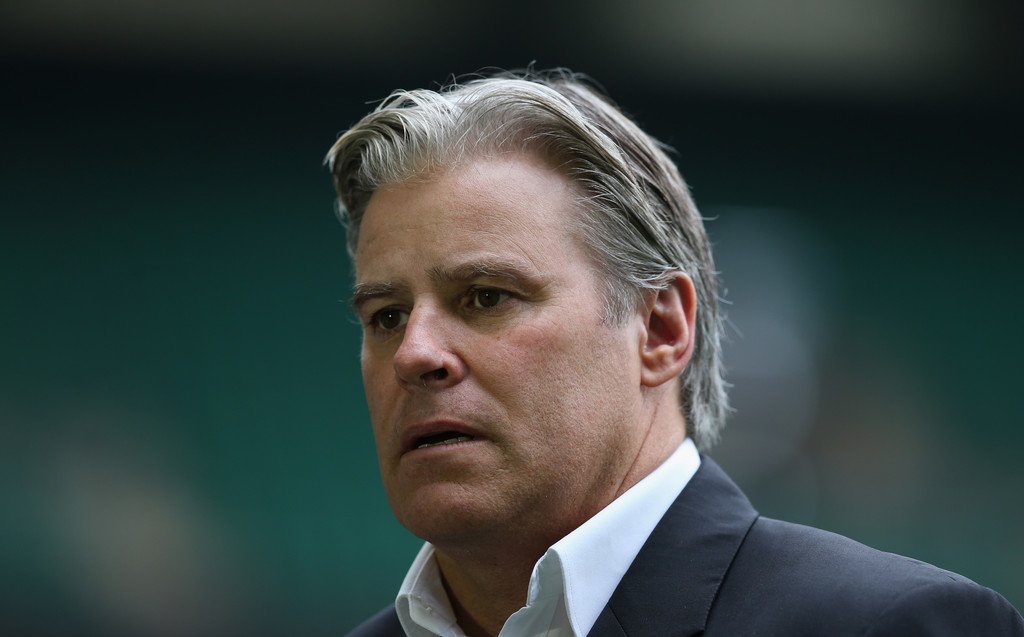Gosper: We have to prioritise player welfare over disruption

World Rugby chief executive Brett Gosper insists red cards are a necessary price to pay to protect players even if they risk blighting the World Cup.
The game’s global governing body issued directives in May intended to clarify the process for officiating high tackles as part of its drive to stamp out dangerous play.
England head coach Eddie Jones, however, has described New Zealand lock Scott Barrett’s dismissal for a shoulder-led clear-out in August as “ridiculous”, adding that games risk “being destroyed by an inconsistent official making a decision on a law that’s not clear”.
Gosper disagrees with Jones, stating the process is unambiguous.
“The high tackle framework does what it’s intended to do which is provide players with better protection for both the ball-carrier and the tackler,” Gosper said.
“There’s a debate to be had on any red card, but there’s a clarity around this framework which takes some of the grey area in interpretation out.
“We’d rather not see red cards but we have to prioritise player welfare over disruption of any one game at a World Cup.
Warburton: 'If something isn't done, then a professional player will die during a game' https://t.co/y61O0h2QOH
— RugbyPass (@RugbyPass) September 7, 2019
“I believe this is the best group of referees, match officials and TMOs we’ve ever had.
“There will be things that happen – there always are in World Cups – but the referees couldn’t be better prepared.
“The high tackle framework is to change behaviour and it’s very clear on what is a high tackle and what the sanctions are.
“In the Scott Barrett case, the vast majority of people believe it was the right call.
“We’ve not had a red card since then and that might indicate hopefully that there’s a little bit of change of instruction by coaches.”
Ireland enter the World Cup at the summit of the global rankings following a summer that also saw New Zealand and Australia occupy top spot.
The merry-go-round has led to criticism of how the standings are compiled, but Gosper insists they fairly reflect the shifting world order.
“The rotation happening at the top of the rankings is a symptom of the competition as it stands,” Gosper said.
“New Zealand have sat at the top of the rankings for the best part of a decade. What’s been happening signposts a very competitive World Cup.
“Our rankings are good indicators of the competitiveness, despite the speculation about them.
“No rankings are 100 per cent perfect – if they were we wouldn’t bother having a World Cup – but they are a good indicator of the tightness of the top five or six teams.”
Just how many 2nd rate kiwi coaches will feature at the Rugby World Cup? Join McOnie, Mils, & Bates in conversation on the Bill Ellis Podcast: https://t.co/PZY8qXgvqU #rwc #rwc2019 #allblacks #rwcjapan #rwcjapan2019 pic.twitter.com/06JI2yiRma
— RugbyPass (@RugbyPass) September 7, 2019
The ninth instalment of the World Cup is the first to be staged in Asia and with 90 per cent of available tickets having sold out, it is already ahead of England 2015.
“Up until the last couple of years, the worry was ‘will we fill stadia?’ But we’ve seen great ticket demand and the tournament will largely sell out at some point,” Gosper said.
“The Japanese have really felt that something special has arrived in town, especially with the Olympics coming less than a year later.
“The World Cup has emerged from the shadow of the Olympics and that had been a worry.
“We’ve been talking about it for so long that we’ve forgotten just how different and trail-blazing it is to take the World Cup to Japan.
“This is wholly new territory for the sport and it’s quite special. It was a bold decision at the time and we’re hoping to prove it wasn’t so bold.”
World Cup guide: North Tohoku



















































